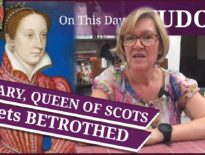Ok, so they didn’t physically bump into each other, but on this day in Tudor history, 18th April 1536, just a month and a day before Anne Boleyn’s execution, imperial ambassador Eustace Chapuys was manoeuvred unto a position where he was forced to pay reverence to Queen Anne Boleyn, the woman he referred to as “the concubine”. By paying her reverence, he was acknowledging her as queen, something that he had managed to avoid doing until now.
What happened and how did Chapuys get into this awkward position?
Find out in today's talk.
Also on this day in Tudor history, 18th April 1587, the famous martyrologist John Foxe died at the age of around seventy. Foxe is known for his book “Actes and Monuments”, or Foxe’s Book of Martyrs, and you can find out more about him and his work in last year’s video:
Also on this day in history:
- 1540 – King Henry VIII made Thomas Cromwell Earl of Essex, just three months before he was executed after being found guilty of treason, heresy, corruption and more.
- 1552 – Death of John Leland, poet and antiquary, in the parish of St Michael le Querne, Cheapside, London. He was buried there. In 1547, Leland “fell besides his wits” and in 1551, his brother was granted custody of him and his possessions. Leland is known for the notebooks of his travels around England and Wales, which were published as “The Itinerary of John Leland the Antiquary” by Thomas Hearne.
- 1555 – Death of Polydore Virgil, Italian humanist scholar and historian, at Urbino. He was buried in the Chapel of St Andrew in the Duomo in Urbino. Virgil has been called the “Father of English History”, and his famous works include De inventoribus rerum and the Anglica Historia.
- 1556 – Death of Sir John Gage, military administrator and courtier, at his home, Firle Place, Sussex. He was buried at West Firle church. Gage's offices included Chancellor of the Duchy of Lancaster, Comptroller of the Household, Constable of the Tower and Lord Chamberlain.
- 1570 – Burial of William Herbert, 1st Earl of Pembroke, at St Paul's, beside his wife. He had died at Hampton Court Palace on 17th March.
Transcript:
Ok, so they didn’t physically bump into each other, but on this day in Tudor history, 18th April 1536, just a month and a day before Anne Boleyn’s execution, imperial ambassador Eustace Chapuys was manoeuvred unto a position where he was forced to pay reverence to Queen Anne Boleyn, the woman he referred to as “the concubine”, thereby acknowledging her as queen, something which he had not done before.
Let me tell you more about what happened, and, by the way, this talk is based on an article I wrote for the Anne Boleyn Files a few years ago.
Chapuys had arrived at Henry VIII’s court at Greenwich Palace on 18th April 1536 to meet with the king regarding negotiations between England and the Empire. He was met by George Boleyn, Lord Rochford, the brother of the queen, and a series of events led to him encountering the queen. Chapuys recorded what happened in a letter to his master, Emperor Charles V:
“Before the King went out to mass Cromwell came to me on his part to ask if I would not go and visit and kiss the Concubine, which would be doing a pleasure to this King; nevertheless, he left it to me. I told him that for a long time my will had been slave to that of the King, and that to serve him it was enough to command me; but that I thought, for several reasons, which I would tell the King another time, such a visit would not be advisable, and I begged Cromwell to excuse it, and dissuade the said visit in order not to spoil matters.”
But Chapuys was not going to get out of seeing Anne.
Chapuys continues the story:
“I was conducted to mass by lord Rochford, the concubine’s brother, and when the King came to the offering there was a great concourse of people partly to see how the concubine and I behaved to each other. She was courteous enough, for when I was behind the door by which she entered, she returned, merely to do me reverence as I did to her.”
As the late Eric Ives pointed out in his book on Anne Boleyn: “Chapuys’ visit to court on 18 April was clearly stage-managed to compel the ambassador to recognise Anne”, i.e. to recognise her as queen, which he did by bowing to her after she’d stopped and bowed to him. Although Chapuys downplays this event in his letter to the Emperor, and it has been noted that Anne was paying her respects to Chapuys, and through him, Charles V himself, and that Chapuys was simply acknowledging that rather than recognising her as queen, his behaviour upset his dear friend Mary, daughter of Henry VIII by his first wife Catherine of Aragon. Chapuys explains that “Although I would not kiss or speak to the Concubine, the Princess and other good persons have been somewhat jealous at the mutual reverences required by politeness which were done at the church.”
Here is an extract from my book “The Fall of Anne Boleyn: A Countdown” explaining what else happened that day:
“Later that day, after dining with George Boleyn, Chapuys met privately with the King to discuss a potential alliance between the Emperor and England. This was a meeting which had been set up by Thomas Cromwell, who seems to have been intent on negotiating a twin alliance, allying England with both the Schmalkaldic League and with Charles V.The only obstacle was Chapuys’ condition that England should accept papal authority. Cromwell had worked on this, leading Chapuys to believe that Henry VIII might come to an agreement with France, instead of with the Empire, if Charles continued to be so demanding.
Unfortunately, at the meeting, Chapuys made it plain that for any alliance to go ahead, the Lady Mary would need to be restored to the succession. Although Cromwell had led Chapuys to believe that this would not be a problem, Henry VIII would not tolerate this idea. In his eyes, Mary was illegitimate and Elizabeth was his heir. Henry blew up, reacting “confusedly and in anger” and “reproached” the Emperor with “great ingratitude”. He made it clear that his relationship with the Pope and his daughter Mary’s future were nobody’s business but his, and that he would not be told what to do by Chapuys and the Emperor. According to Chapuys, Cromwell and Audley “appeared to regret these answers” and when Chapuys spoke to Cromwell, the secretary was “mortified” by what had happened and was “hardly able to speak for sorrow”. The stress of the situation led to him arguing with the King and then taking to his bed “from pure sorrow”. The King was ruining Cromwell’s negotiations!"
So, a stressful day for Cromwell back in 1536, but soon Anne Boleyn would be out of the way.



Leave a Reply